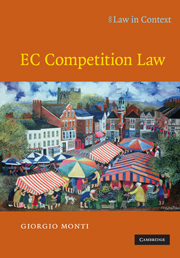Book contents
- Frontmatter
- Contents
- Preface
- Table of cases
- Table of legislation
- 1 Competition law: policy perspectives
- 2 The core values of EC competition law in flux
- 3 Economics and competition law
- 4 Competition law and public policy
- 5 Market power
- 6 Abuse of a dominant position: anticompetitive exclusion
- 7 Abuse of a dominant position: from competition policy to sector-specific regulation
- 8 Merger policy
- 9 Oligopoly markets
- 10 Distribution agreements
- 11 Institutions: who enforces competition law?
- 12 Competition law and liberalisation
- 13 Conclusions
- Index
2 - The core values of EC competition law in flux
Published online by Cambridge University Press: 05 June 2012
- Frontmatter
- Contents
- Preface
- Table of cases
- Table of legislation
- 1 Competition law: policy perspectives
- 2 The core values of EC competition law in flux
- 3 Economics and competition law
- 4 Competition law and public policy
- 5 Market power
- 6 Abuse of a dominant position: anticompetitive exclusion
- 7 Abuse of a dominant position: from competition policy to sector-specific regulation
- 8 Merger policy
- 9 Oligopoly markets
- 10 Distribution agreements
- 11 Institutions: who enforces competition law?
- 12 Competition law and liberalisation
- 13 Conclusions
- Index
Summary
Introduction
EC competition policy is currently undergoing a significant shift in economic theory and political ideology as well as in its institutional enforcement structure (a change along all three sides to the prism proposed in chapter 1). In this chapter we suggest that, from a political perspective, competition policy in the EC originally promoted three ‘core’ values: competition (understood as the maintenance of economic freedom), the integration of the internal market and economic efficiency (as a means of enhancing consumer welfare). In the past, the first two values were pursued more assiduously than the last, while today economic efficiency and consumer welfare play a more significant role in motivating competition law enforcement. The effect is that the role of economic analysis in resolving competition cases takes centre stage.
In chapter 3 the history of economics in US antitrust allows us to see that there are different economic perspectives through which competition law can be enforced, and that shifts from one economic model to another are often instigated by changes in the policy consensus over how markets work. This means that as the Community resolves to emphasise economic considerations, we must determine the normative foundations of the EC's approach before investigating how economics is used. At the end of chapter 4 we suggest that three themes underpin the economic approach favoured by the Community: consumer welfare, market power and pluralism. These themes prescribe an aggressive policy that is in line with post-Chicago economic theory.
- Type
- Chapter
- Information
- EC Competition Law , pp. 20 - 52Publisher: Cambridge University PressPrint publication year: 2007
- 2
- Cited by



